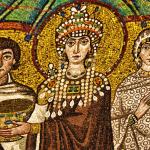Voice in the Wind, pp. 447-454
The scene opens with Primus telling Julia “another of his ribald stories,” much to her amusement, as they recline in the triclinium. Prometheus is there as well, leaning against Primus as Julia laughs. Then we get this:
“[Primus] frowned in annoyance as Hadassah entered the triclinium with another tray. Prometheus stiffened slightly and drew away from Primus, who gave an irritated sigh. “Set the tray there and leave us,” he ordered tersely and glanced at Julia. “Tell her, Julia.” She nodded, and Hadassah silently went from the room. “I don’t like her,” Primus said, glaring toward the empty doorway.
“Why not?” Julia said, selecting a honeyed hummingbird tongue from the platter.”
“Because every time she enters the room, Prometheus becomes agitated. Why don’t you sell her?”
“Because she pleases me,” Julia said, and poured herself more wine. “She sings and tells stories.”
“I’ve heard some and I don’t like them, either. In case you hadn’t heard, Calabah has a healthy dislike for your slave, also.”
“She’s told me.” Julia gave him an impatient look and sipped her wine. She knew she was getting drunk, but she didn’t care. It was better than suffering from depression. She’d had no word from Atretes or Marcus or her mother. Everyone had deserted her. She saw Prometheus’ eyes flickering nervously toward the archway and felt a malicious satisfaction.
Wow, so many things going on here. First, that both Primus and Calabah dislike Hadassah is going to become important to the rest of the story. Second, I’m still not entirely sure what is going on with Prometheus. In a comment last week, a reader reminded me that the second book tells more of his story. I’ve ordered the second book used so that I can skim it and refresh my memory on how that storyline turns out, but it hasn’t come yet.
Third, a Roman wouldn’t have known the term “depression.” A quick google search suggests that the correct term would have been “melancholia.” One article I read suggested that the Romans believed melancholia was caused by the anger of the gods. This whole section could have been more period-specific and interesting if Rivers had brought this into the story—but does Julia even believe in the gods? She would have, but she doesn’t seem to.
At this point Marcus shows up. He glares at Primus and Prometheus as they leave the room together.
“How you can sit and see who he acts with that boy is beyond me, Julia.”
Defensive, she retaliated. “Perhaps I’m more tolerant of others. And who are you to judge Primus? I saw you more than once with Bithia.”
“There’s a vast difference.”
“Indeed there is. Primus is more faithful to Prometheus than you ever were to Arria or Fannia or a dozen others I could name.”
None of this feels realistic for the period.
“You’re happy living this way?”
“Yes. I’m happy! Happier than I was with a repulsive old man obsessed with his studies or a handsome young man who was cruel beyond words.”
Oh by the way, we learn this about Phoebe:
“Did mother tell [Father] why I left?”
“She said you were visiting friends. He seems content with the letters she reads to him.”
“What letters.”
Marcus looked at her in surprise for a moment, then let out a soft breath of comprehension. Poor Mother. “Apparently, the ones she writes in your name.”
Julia got up and moved away from him, wanting to escape her guilt.
Fun.
But that is not why Marcus has come. He has come because, like everyone else, he wants to throw Julia at Atretes. Atretes sent a guard to their parents’ house to fetch her, you see. Marcus was there when the guard came to the house, and told the guard that Julia was not in. At this news, Julia is overcome.
“Oh, Marcus. Where is he? You didn’t send him away, did you? If you did, I’ll kill myself. I swear it.” Her eyes welled with tears.
Oh, Julia.
Anyway, Marcus somehow didn’t know that Julia had been “involved with” a gladiator, making me wonder whether he even sees his sister. He recognizes, now, that Julia is pregnant, and correctly guesses that the baby is Atretes’. He also correctly assesses that Julia hasn’t told Atretes anything about Primus—and he recalls that Julia moved in with Primus the day after the day Atretes gained his freedoms in the games (here at least his memory is good).
“Julia, I spoke to his guard. Atretes bought an estate a few miles outside Ephesus. He expects to marry you.”
She kept her face averted, and Marucs stood and went to her. He turned her around to face him and saw she was crying. “You don’t betray someone like Atretes,” he said softly.
Handsy Marcus is handsy.
“Right now, I’d approve anything over this unnatural arrangement you are in. I”ll take you to Atretes myself, right now if you wish it.”
I’m suddenly curious. How common was it for a high-born Roman woman to marry a wealthy freed foreign gladiator? And in contrast, how common was it for a married man to have a catamite? Because honestly Marcus’ concern here feels historically backwards. Wouldn’t he be more concerned about marrying her to a foreign gladiator than he would be about marrying her to a well-born Roman man who has a dalliance with an adolescent male slave?
Julia explains why she can’t marry Atretes, and Marcus scoffs at the idea that Atretes will accept her arrangement.
“Isn’t it the same thing as Arria?”
He frowned. “What are you talking about?”
“You knew about her affairs with various gladiators. She used to tell you about them, don’t you remember? I asked you why you permitted her to be unfaithful to you, and you told me Arria was free to do whatever she wished. And you were free to do the same.”
“I never intended you to fashion your life after Arria.”
“I didn’t. I fashioned it after you.”
Marcus stared at her, stunned into silence.
BAM.
Marcus prepares to leave, but says he’ll come back. “Maybe I can undo what I’ve done,” he says. Julia thinks he’s joking. He’s not. On his way out, though, he runs into Hadassah. We all know that will go GREAT.
He reached out and let his hand glide down her arm. “I’ll find a way to bring you home,” he said huskily.
She withdrew from his touch. “Lady Julia needs me, my lord.”
He let his hand drop to his side. She stepped past him. “I need you, too,” he said softly.
At this point Marcus realizes that Primus has seen the whole affair from a balcony. Primus gives him a mocking look and Marcus walks “angrily” to the door to leave. This is going to go great.
Oh yeah—and handsy Marcus was handsy.
The last bit here is perhaps best summarized. Julia finally talks to Atretes. He reacts violently and declares that “If you weren’t with child, I’d kill you.” In a rage, he walks out, hops in a chariot pulled by two white stallions, and rides dangerously across town and into the country, to his villa outside the city. Once he gets there he begins smashing things. He lights the place on fire, screams at the slaves to get out, and then “threw back his head and cried out in a savage rage” so loudly that “shepherds heard it on the hillsides.”
Um. Yeah.
I have a Patreon! Please support my writing!















